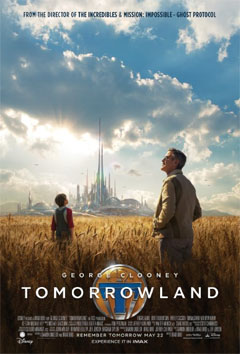Review: Tomorrowland
 The last 10 minutes of a movie are often what shapes our opinion most -- a strong ending can soften our feelings about a bad movie, and a weak, tone-deaf ending can spoil a filmgoing experience far more thoroughly than any overly revealing trailer or review. Tomorrowland is often a breathtakingly gorgeous movie with charming performances, but the ending is so unabashedly lesson-driven and heavy-handed that it's difficult to remember anything but its flaws and missteps.
The last 10 minutes of a movie are often what shapes our opinion most -- a strong ending can soften our feelings about a bad movie, and a weak, tone-deaf ending can spoil a filmgoing experience far more thoroughly than any overly revealing trailer or review. Tomorrowland is often a breathtakingly gorgeous movie with charming performances, but the ending is so unabashedly lesson-driven and heavy-handed that it's difficult to remember anything but its flaws and missteps.
The movie's opening and closing scenes are meant as bookends, but these are bookends created by your clumsy kid brother in shop class on the day the nails ran short. The first scenes in particular feel like a hurried reshoot/restructure to get George Clooney onscreen earlier. Frank (Clooney) and Casey (Britt Robertson) are speaking directly into the camera, making a video for an unknown audience. With interruptions from Casey, Frank begins setting up the story through flashbacks to his childhood.
Young Frank (Thomas Robinson) visits the 1964 World's Fair -- which includes the Disney "It's a Small World" exhibit, natch -- to win an inventors' contest with his jet pack that doesn't ... quite ... work. He fails to impress the judge (Hugh Laurie) but young Athena (Raffey Cassidy) manages to sneak him access to a hidden, magical land, aka Tomorrowland (based on the Disney theme park).
The movie then abruptly shifts gears to Casey's story, which seems to be set in the near future -- her father is a NASA engineer, and she keeps trying to sabotage attempts to close Cape Canaveral down. Her unbounded optimism, interest in science and desire to fix everything catches Athena's attention, and she decides to introduce Casey to Tomorrowland too ... in the hopes that she can convince Frank, who's become even more you-kids-get-off-my-lawn than Clint Eastwood, to help them solve drastic problems affecting Tomorrrowland and the contemporary world.
Unfortunately, the entire concept of the Tomorrowland world feels weirdly Ayn Rand-ian and the movie feels at times like a pro-STEM propaganda piece aimed at kids. Filmmaker Brad Bird has never been subtle about messaging in family films such as The Iron Giant, The Incredibles and Ratatouille, but stellar storytelling with compelling characters took front and center. In addition, Tomorrowland is hampered by obvious Disney brand marketing, as off-putting as it was in Saving Mr. Banks.
Two of the three leads in Tomorrowland are young women -- Disney STEM Princesses, so to speak -- which is refreshing to watch, with bright and engaging performances from Robertson and Cassidy. Clooney and Laurie are always fun to watch. Robinson is uncannily like Clooney at times. And at its best, the movie is reminiscent of 1970s live-action Disney adventure films like Escape to Witch Mountain.
The highlight of Tomorrowland is the visual portrayal of the title location, particularly impressive on a large screen (in 2D). The score from Michael Giacchino, however, too blatantly punches up the emotional moments to tell how how we should react. It's disappointing compared to his perfectly complementary score for The Incredibles.
Tomorrowland is geared toward kids, and its entire lack of any subtlety, from messaging to music cues, indicates that Disney and the filmmakers -- Bird and co-writer Damon Lindelof -- have no faith in the ability of children to understand anything that isn't spelled out in capital letters. By making everything stupid-simple for a slow eight-year-old to understand, the movie alienates an adult audience and is ultimately unsatisfying. On the other hand, as a family-friendly movie outing, it at least might get your kids interested in science.

